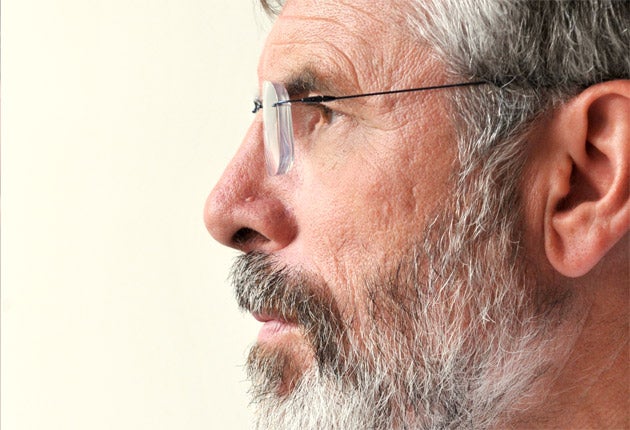The Weekend's Television: The Bible: A History, Sun, Channel 4<br/>Indian Hill Railways, Sun, BBC4
Caught up in the crossfire

"For as long as I have a memory, Jesus has been in there," said Gerry Adams in The Bible: a History.
Quite a lot of people would feel that Jesus got badly lost in there, his voice inaudible beneath the sound of bombs. But not Gerry Adams, it seems, who clearly believed that the ethical standing of armed struggle is still a moot point. He would, he said, be "reflecting on my own life, all the twist and turns of it... did the teachings of Jesus impact upon that in a positive way or did I ignore them?" The answer, an hour later, seemed to be unequivocal. He'd ignored them whenever they proved inconvenient. The Sermon on the Mount, for example, identified here as the very core of Christ's message, turns out to be an absolute bugger for anyone who thinks that Semtex is a legitimate political tool. Not only does Jesus expect you not to kill your opponents, he wants you to love them too – and let them slap you around a bit. Not put an Armalite to their heads and bury them in a bog.
Adams at least didn't try and pretend any different, substituting the tricky exigency of the Gospels with a more flexible moral code he called "my own lights" or "my own standards". He'd managed to meet those, he said, comfortably. And it was clear that Jesus had had his uses for him, as a conceptual model of the martyred victim. Adams had forgiven most of those who had sinned against him, he explained, but he still couldn't forgive those in power who had constructed the system. "Those who exploited the differences, who sectarianised it, who brought in all of their technology... much like those who actually had to take a conscious decision to construct a cross." Did he realise that he was implicitly comparing himself to the crucified Christ here? It was hard to say, but that he still feels more sinned against than sinning is unquestionable.
Like the presenters who have preceded him in this series, Adams discovered that the moment the Gospels touch the historical record they tend to be exposed as all too human, twisted by political considerations or local pragmatism. Wouldn't it prove awkward to have the Romans as the killers of Christ at the very moment when you were seeking Roman converts? Never mind, you can shift the blame to the Jews instead with the story of Pilate and Barabbas. Unlike all the presenters who have preceded him, Adams had to submit to some cross-questioning from off screen, an acknowledgement that he was always going to be a controversial choice. "Surely you can't pick and choose?" someone asked, referring back to Christ's commandments. "Well, you can," replied Adams. "You mightn't be right to do it... but we all do it." Then he sat down with Alan McBride, the husband of a woman killed by an IRA bomb. "I think we need to be more like Jesus and a bit less religious," McBride said, a penetratingly simple injunction that contrasted pointedly with Adams's easy self-absolution.
I don't suppose that the BBC was expecting Indian Hill Railways to be a break-out success, given that it has a title that robustly narrows its own viewer demographic . If you like India or railways you'll know this is for you. At a pinch even liking hills might even be enough to get you tuning in. But anyone outside those narrow categories who takes a look should also find something to their liking here as well. Apart from the soap-operaish accounts of the railway employees' lives, there are the unique operational problems of sub-continental railways. Who could not love a line where services may be delayed because of the wrong kind of elephant?
t.sutcliffe@independent.co.uk
Subscribe to Independent Premium to bookmark this article
Want to bookmark your favourite articles and stories to read or reference later? Start your Independent Premium subscription today.

Join our commenting forum
Join thought-provoking conversations, follow other Independent readers and see their replies